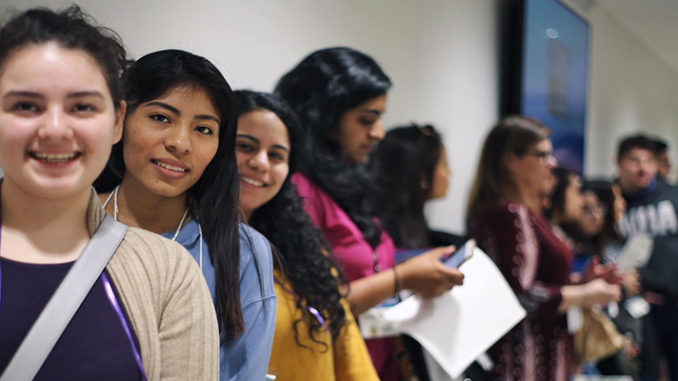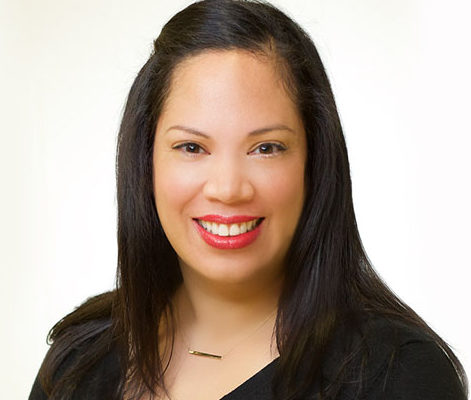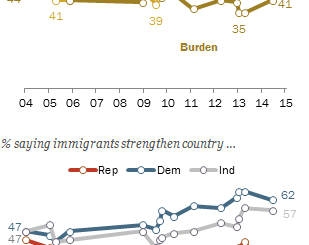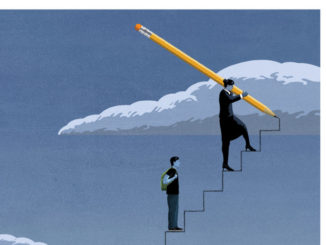
In 1991, Irma Muñoz was struggling to get into college amid the height of an anti-immigrant fervor in California fueled by Proposition 187, a state measure aimed at prohibiting illegal immigrants from accessing public services, including education and health care.
Muñoz had immigrated with her family to the Bay Area from Guadalajara, Mexico, a few years earlier, and since she was undocumented, her college applications were flagged for missing information. Through a series of events over which she had little control, the teen became embroiled in what was, at the time, the fiercest battle over immigration policy in the U.S.
That is, until President Donald Trump’s 2016 election.

The oldest of four siblings, Muñoz didn’t speak English when she arrived in Hayward, California, in the late 1980s. Being plunged into a new culture and language was a struggle, and she credits her dedicated public school teachers for pushing her to work hard and graduate from high school. In 1996, she graduated from the University of California, Davis, and later from Harvard University’s School of Government.
Today, Muñoz is the chief operations officer of IDEA Public Schools, the national charter school network serving 30,000 students in 51 schools throughout Texas. The network plans soon to expand outside state boundaries for the first time: In 2018, four charter schools are expected to open in Baton Rouge, Louisiana. Muñoz oversees network-wide operations, including the departments handling transportation, attendance, recruitment, facilities, nutrition, marketing, and information technology, from IDEA’s headquarters in McAllen, Texas, just a few miles from the Mexico border.
Muñoz insists her story isn’t unique. In some sense, it isn’t — she works with thousands of students in IDEA schools who have immigrated to the U.S., many of whom were or are undocumented and face similar struggles. In other ways, Muñoz’s journey from her country of origin to college and career is extraordinary.
In an in-depth interview with The 74, she reflects on that early experience and how it shapes her life now as an American citizen, a mother of two young children, and an educator in the Rio Grande Valley, the front lines of today’s immigration debate.
You emigrated from Guadalajara, Mexico, as a teenager and were undocumented for several years before gaining citizenship. Now you’re a top executive at one of the country’s most prominent charter school networks, where 95 percent of students are Hispanic or Latino, many are from low-income families, and a good number are undocumented. Tell me a little about what it was like arriving in the U.S. and pursuing your education. How did you get from point A to point B, and what was that experience like?
My parents’ singular focus was to give us an education because they wholeheartedly believed that that was the key to the American dream. It’s interesting because without any formalized training and guidance, they just had really good instincts. One of my first memories when I came to this country was my dad getting into a fight with school counselors because they wanted to put us into an ESL program, because my dad was worried that we wouldn’t learn English quick enough if they did. So he, against all advice, ensured that we were placed in English-speaking classrooms because he believed that that was a more direct path to our success, which I know is controversial. I myself am a believer in bilingual education and ESL, and it was really hard [learning English in high school], but I think what made a difference in my life, because I was the oldest and I joined America almost as an adult without speaking the language, was a teacher who took an interest in me and offered to tutor me before school and during lunch and after school and really believed in my potential and made sure that I believed it too. She was the one who encouraged me to take Advanced Placement classes and read books in both English and Spanish, and she helped me apply to colleges during my senior year.
Your journey to securing American citizenship began around that time, and it was pretty rough, to say the least. What happened when you were applying to college as an undocumented teen?
What was tough about that process was — though my father instilled the fear of God in all of us because … he was terrified of us being deported at any moment — because I was so young, I didn’t really understand the ramifications of not being in the country legally. When I applied to college, it was the start of this anti-immigrant wave in California, and unfortunately my case was used publicly as a debate point during the controversy over Proposition 187 [the ballot proposition championed by former Republican governor Pete Wilson that was intended to bar illegal immigrants from accessing many public services, including education. California voters passed it overwhelmingly in 1994, but it was later ruled unconstitutional].
When I wasn’t able to produce some information in my applications, I was told that I wouldn’t be able to attend. We believe that a school guidance counselor who was trying to be helpful [tipped off] a local reporter and a local activist friend, and there was a small article in the local newspaper about my college application struggle [that was] picked up by the San Francisco Chronicle, and then the Latino media got involved. And because it was such a hot topic in California, you had people like Alan Nelson [the former commissioner of Immigration and Naturalization under President Ronald Reagan, who later became a vocal proponent of Prop 187] picking this information up and publicly debating it, including the question of whether I deserved to go to college and whether the investment in me was worth it.
[It was] incredibly mortifying. That’s when I really understood the impact of my own immigration status. I can vividly remember the look on my father’s face when he realized that our immigration status became public.
I was lucky because I was one of thousands of students that year able to make it through the process, with the help of Legal Aid workers in San Francisco and state and local lawmakers like longtime California legislator Richard Polanco [for whom I later worked during a college internship.]
A lot of people rallied behind me and created this path that allowed me to go to college, so I knew once I got there [the University of California, Davis] how privileged I was and how important it was for me to not let anyone down, including my parents.
How do you view the trajectory of American immigration policy over the past few decades, given your experience as a teen in the ’80s and ’90s and your role as a school leader in the current climate?
We’ve gone through incredible changes in immigration policy and understanding the impact of the immigrant community, not just on the economy but on the social life and the social fabric of this country. But it does feel like déjà vu a little bit with the recent election and the rhetoric in particular that is espoused by our leaders, and it’s scary. And I am now a mother who’s legally residing in the country; I married a man who was born and raised in America; I speak English; and I’m myself having trouble reconciling what is happening politically throughout our country and in this state, and seeing the effects of these policies in our kids. It’s taking me back to how I felt growing up and how I felt when I was in high school getting ready to step foot in college.
“And that is the true travesty of this debate — that in order to impact immigration, the policy is having unintended consequences on children who didn’t have control over their immigration status.”
Your job involves overseeing the large-scale operations for one of the biggest charter networks in the country, where 95 percent of students are Hispanic, and many are from undocumented families. What’s changed in your daily life and your work with staff, students, and families as a result of the Trump administration’s crackdown on enforcing immigration policies and the new Texas law, Senate Bill 4, which essentially bans sanctuary cities by making it a crime if local officials do not cooperate with federal immigration authorities?
We have [31] schools located in the Rio Grande Valley [within a few miles of] of the U.S.-Mexican border. We live side by side with [Immigration and Customs Enforcement, or ICE]. On my way to work, I pass no less than three or four immigration patrol trucks; my neighbor works for the border patrol. So this is something that is part of our everyday lives. When you realize, for example, that the neighbor that you’ve known forever could now be the person responsible for changing your life or deporting you … the impact of that is far-reaching.
We have a lot of scared families that are trying to figure out what safety means for them in this new context. I think when people think about Senate Bill 4 they think about it as an immigration policy; what gets lost in the debate is that it’s also an issue of safety. When you have [undocumented] members of the community who are not fully integrated, the social fabric begins to disintegrate and you have people who will be afraid of going to law enforcement and reporting criminal activities; they’ll be afraid to step in and offer help when there is an accident … they’re going to be afraid of doing things like volunteering. And they might be afraid of sending their kids to school and seeking the assistance kids need in order to thrive. And that is the true travesty of this debate — that in order to impact immigration, the policy is having unintended consequences on children who didn’t have control over their immigration status.
More specifically, I can tell you about two serious changes that have directly impacted our work as school leaders. One is the uncertainty around DACA [Deferred Action for Childhood Arrivals, the 5-year-old policy created by President Barack Obama that grants temporary legal protections to minors brought to the U.S. illegally, and allows them to apply to college and jobs]. DACA was such an amazing [opportunity] for our students. We [helped host] legal clinics that paired up families with volunteer attorneys from UT [University of Texas] Austin and Legal Aid programs throughout the state so students could take full advantage of DACA. Many were able to not just attend but graduate from college, and come back to their communities and become teachers in our own schools, which gave us a full-circle moment.
Over the last couple of months, the uncertainty around whether or not this program will continue and around what will happen with [current] recipients has really taken a toll. Not just on our students, but now on employees who are some of our best teachers and who are struggling with what to do. They are also answering questions from worried students, families, and alumni about the program’s viability.
The second issue is the [changing] role of ICE in law enforcement and what jurisdiction they have in conducting raids throughout cities where we have schools. [IDEA has 14 schools in San Antonio and six in Austin, as well as 31 in the Rio Grande Valley.] A few months ago, Austin was one of several cities targeted nationally by ICE, and there were a series of raids. Unfortunately, they impacted the neighborhoods where we have schools, and some of our families were directly impacted. Parents were deported, grandparents were deported, aunts and uncles were deported, and it had a ripple effect in our communities. We had to change the way we were talking about immigration and the way we understood immigration within our school communities because we needed to become counselors and partners to our families that were going through this. And that was really tough. There was a lot of fear and a lot of unanswered questions that our kids had.
How has the network been addressing these concerns and uncertainties?
We stand 100 percent behind our students and our teachers. And we’re working with attorneys in the area to better understand the implications of the changes and are voicing our opinions to Congress, to our state representatives, because we wholeheartedly believe that our students, our teachers, who happen to be former students, deserve the opportunity to pursue the American dream.
What’s your policy on ICE access to your campuses?
Generally speaking, an agent wouldn’t be allowed access to any student information unless they have a subpoena.
How much of your personal experience and path to citizenship do you tend to share with the students and families you work with? How does it relate to IDEA’s primary mission of getting all students “to and through” college?
When I talk to my students, I talk about the fact that to [whom] much is given, much is expected. And they are in this incredibly unique situation where they’re graduating from high school — which is already beating the odds — and they’re getting this amazing opportunity to go to college. They are standing on the shoulders of others that paved the way, and others will stand on their shoulders. When you … graduate from college, you open a window not just for yourselves but for your siblings and your family and for generations to come. Acknowledging that is incredibly powerful because it really is about controlling the destiny of your family’s legacy. Every single student I meet, regardless of immigration status, wants the American dream, however they define it for themselves. So it’s tough when external factors impact a student’s ability to pursue their dreams.
“Every child, regardless of immigration status, is a potential future leader, and they will have the ability to impact our lives and the success of our country for generations to come.”
As an educator, what is your response to the anti-immigrant sentiment voiced by Trump supporters and others who support policies like Senate Bill 4?
Children succeed [if] adults in the system, any system, get it right. A child’s immigration status is not defined by their own doing. Children rise to the level of expectation that we as a society set for them. So if our kids are hearing that [they’re] not going to succeed, that it’s not worth investing in them, that we need to take care of our own, we’re sending messages about their potential and their ability to contribute to society. Every child, regardless of immigration status, is a potential future leader, and they will have the ability to impact our lives and the success of our country for generations to come. And if we are not mining that potential, it’s going to be our fault when our kids don’t succeed.



